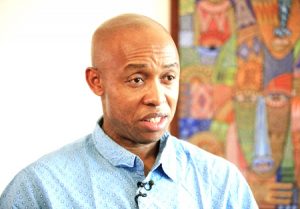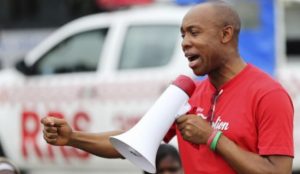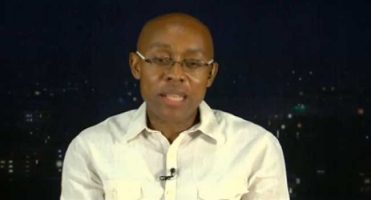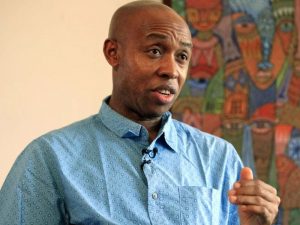Former Chairman of the National Human Rights Commission (NHRC), Chidi Odinkalu, was one of the most vocal critics of the Jonathan administration. In this first part of his interview with our Correspondent, BASIL ABIA, he shares a rare insight into his job at the commission and how the former president widely known as GEJ, supported NHRC’s campaigns which obviously hurt his interest.
NE: You were the Chairman of the Human Rights Commission for four years. Can you share your experience with us?
First, I come out of the National Human Rights Commission with tremendous gratitude to Nigerians. Nigerians demand decent effort from their public servants and to me that isn’t not too much to ask for. The other thing is that I also come out of the experience with gratitude not just to the people but with a profound understanding of the country. When I talk about gratitude from Nigerians, it simply means that irrespective of the fact that my tenure is still long done, I still have people coming to me with their human rights problems as well people appreciating me all the time. I have people being over-generous to me. In fact, I still have some taxi drivers from around the country refusing to charge me for the services they render to me whenever I am in their locality for an event or work-related purposes. I have people till date paying for my meals simply because they are appreciative of the work I did while in charge of the National Human Rights Commission. My experience then always makes me feel good now. I am extremely grateful for having led the commission.
NE: Did you have any lows?
Of course, there were challenges but I didn’t have any lows. I mean having to lead a team of people who really don’t seem to share the same views or ideals with you to achieve set out goals was a challenge, but that is a necessity in a public service life. I will continue to say that the people with whom I could carry out my duties with ease and fulfillment were surprisingly the politicians and the security services. I know this may sound ironic but this is the truth.

NE: Sir, you were a vocal critic of the Goodluck Jonathan administration even when it was the same government that appointed you into the NHRC. Where you at any time threatened or reprimanded for speaking up against the administration?
I think I wouldn’t call myself a vocal critic. The rule of a human rights institution is not to sing the praises of government, it is to speak truth to power. When they do right, you’re supposed to acknowledge it, when they fail, you’re supposed to tell them you’re failing. Now, it wasn’t my brief to praise sing or to criticize. I had a statutory role to speak truth to the government and yes, I had colleagues who didn’t think that was the right thing to do and many of them were in my governing council and on the staff of the human rights commission. The job required professionalism and I’ve got to give due credit to Goodluck Jonathan. Irrespective of the number of things I didn’t agree with him and his government, he supported our programmes and campaigns to the hilt. And to the occasion where I had to go tell him that ‘we need your support’ or ‘we want to embark on something,’ he absolutely did give us hundred percent. There were occasions where people were very unhappy with me, there were occasions where I had to be fired and I was under investigations for quite many times, although nothing was found, that was okay by him. I never met him before I was appointed so I can’t say because he knew me somewhere. He is definitely not from my state or from the same ethnic background. So, I’ve got to give him praise for holding institutions in high regard.

As far as the human rights commission is concerned, you are part of the state and not necessarily part of the government. And that means I can live a life that I was always comfortable with. I didn’t have an official car, I certainly didn’t have a retinue and wasn’t paid any salary. So, it was possible to continue with my life. There was no official house and there was no severance package. I am happy to live my little non-disclosed life and that I think is the way it should be.
NE: Under your watch as the chair of the NHRC, the Human Rights Watch published a damning report about human rights violations by the Nigerian Military in its fight against insurgents in the North-East. Was your commission aware of such violations and why did it take a foreign organisation to raise the alarm about it?
Quite the contrary. The one thing I was very adamant about was that under my watch as the chair of the National Human Rights Commission, we were not going to be getting reports of human rights violations in Nigeria from international human rights monitoring organisations and that didn’t happen. So, when you’re speaking about the North-East, the commission had the necessary documentation. We did the Baga investigation against all odds, even in the face of opposition from some members in my own governing council. Because these members didn’t think it was the role of a public institution and my view then and now was that, we cannot abdicate our responsibilities to foreign entities. We did the Apo killings investigation, again in the face of considerable odds, we took on the Southern Kaduna killings. And we have the most extensive analytics and reports on what transpired in the North-East and I personally took that to the leadership of the Nigerian government. And I met one-on-one with the then president and I told him, ‘look, we need your full support to do this,’ and he told me to go right ahead. So, you see, I feel very at peace with the work accomplished.
NE: You played a very significant role when hundreds of job seekers died while trying to participate in a fraudulent recruitment exercise conducted by the Nigeria Immigration Service under the then Interior Minister, Abba Moro. Could you shed more light on that Sir?
I thought it was a scandal that Abba Moro wasn’t fired, that was my view then and that is my view now. There’s no need hiding it. It just doesn’t make sense, especially when you head that kind of exercise and that type of casualty is recorded, somebody has got to take responsibility. I thought it was irresponsible then, I still think it was irresponsible now. It is good that he’s being prosecuted. I think he (Abba Moro) should be. That was at minimum culpable homicide punishable by a death sentence; otherwise known as manslaughter. Somebody had to pay for that. You don’t subject people to that and think it’s normal. It isn’t. Nigerian lives have got to matter because it could be you or I in that position. When a Nigerian life is killed, government has got to make a statement that a Nigerian life is worth something. It’s not when people are killed and then you say, ‘Oh! Only 10 people were killed. Oh! Only 20 died or only 200 died, like 200 lives don’t mean anything.’ We buried 247 in mass graves in Kaduna and we were told “Only.” So, that exactly is the problem that we’ve got to make Nigerian lives count.
NE: Do you have anything to say about the Aluu killings, which judgment has just been given?
There have been some convictions now, obviously we’ve got to wait for the appeals to have everything ascertained. On the balance though, that should be good news. Of course, there’s no way you can bring back the lives of the young men killed in that unfortunate event, or indeed compensate the families or console them. But I do hope that over time, they will take consolation in the fact that their children have been exonerated of the crimes accused and justice meted to their killers.
NE: What then are your thoughts on jungle justice, especially as it has become very common in Nigeria?
It is clearly an evidence of a deeper problem in our society, which is a failure of the institutions of accountability and of justice. And we’ve got to ask ourselves, how we got ourselves here, because people want to be safe, they want to be secured. The only society that can get itself rid of the menace of jungle justice is the society that establishes for itself proper institutions of accountability and justice as well as make investments in a police force that serves duly and effectively. As well as a society that does not have senior advocates that do not think they are above the law or judges/justices that think they can only profit from the system and does not have an SSS that think they can go to some judges houses at night and hit them on the head and treat them like they are not human beings.
NE: About three months ago, there was a deadly clash between the Nigerian Navy and the Police in Calabar, Cross River State. What are your thoughts about such rivalries by our security agencies?
They all think they are ‘gods,’ and that they are all above the law. And this is also part of the jungle justice affair. Simply because they are in uniform, they think that they are above the law and nobody can subdue them to any rules, so they misbehave. And when they find themselves up against one another, instead of exercising due process, they have these disappointing clashes.





